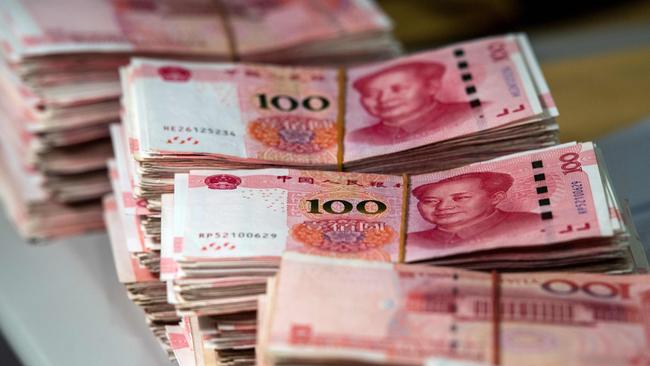China accused of manupulating its currence
The US Treasury labelled China a currency manipulator after the Chinese central bank let the yuan depreciate.

The US Treasury designated China a currency manipulator after the Chinese central bank let the yuan depreciate, capping a day of trade war escalations that sparked a global fall in financial markets and fears the clash could stall the US economic expansion.
The uncertainty could pressure the Federal Reserve to consider more interest rate cuts, following its decision last week to lower rates for the first time in more than a decade.
China’s yuan fell as much as 1.9 per cent to a record offshore low of 7.1087 to the dollar in Hong Kong, according to data from Refinitiv, its biggest single day loss against the dollar since August 2015.
In mainland China, the yuan also weakened beyond the 7 yuan to the dollar level — which policy makers in recent years have defended — for the first time since 2008, before stabilising, supported by signs that Beijing might not permit a steep depreciation.
In addition to the currency move, Beijing said Chinese companies had suspended purchases of US agricultural products, and that the government has not ruled out putting tariffs on US farm goods purchased after August 3.
China’s central bank said Monday’s depreciation was “due to the effects of unilateralist and trade protectionist measures and the expectations for tariffs against China”. People’s Bank of China governor Yi Gang said China would not engage in competitive devaluation and that the decline was due to market forces.
President Trump, who as a candidate repeatedly threatened to designate China a currency manipulator, took the devaluation as a deliberate shot at the US. “China has always used currency manipulation to steal our businesses and factories, hurt our jobs, depress our workers’ wages and harm our farmers’ prices,” Mr Trump wrote in a tweet on Monday. “Not anymore!”
A weaker yuan makes Chinese goods more competitive abroad, and makes US products and other imports into China more expensive.
The decision to label China as a currency manipulator for the first time since 1994 comes just four months after the US Treasury passed on an opportunity to make such a formal designation as part of its currency report. Treasury uses three criteria to apply the designation: actively intervening in their currency markets, having large trade surpluses with the US, and having large overall current-account surpluses.
Monday’s action by Treasury is mostly symbolic, requiring the US administration to consult with the International Monetary Fund to try to eliminate the unfair advantage the currency measures have given a country.
“The announcements from Beijing represent a direct shot at the White House and seem designed for maximum political impact,” said Chris Krueger, strategist at Cowen Washington Research Group. “We expect a quick, and possibly intemperate, response from the White House, and expect a more rapid escalation of trade tensions.”
The back-and-forth between the world’s two largest economies sent global financial markets reeling, with the Dow Jones Industrial Average falling 767 points to 25717.74 and the S&P 500 index down 3 per cent to 2844.74.
US officials had been expecting retaliation from Beijing after Mr Trump said last week he would impose 10 per cent tariffs starting on September 1 on about $US300 billion ($440bn) in Chinese goods that as yet are not subject to levies.
The president followed that up by saying he could ratchet tariffs even higher, above 25 per cent, as he complained that China hasn’t followed through on expectations it would buy more US farm products.
The Trump administration began imposing tariffs last year in an effort to get China to make structural changes to its economic system to benefit US companies and to purchase more US products to narrow the trade deficit. Some observers expect the US to pause before taking any countermeasures.
“This is not a surprise,” said Derek Scissors, a senior trade expert at the American Enterprise Institute who occasionally consults with the administration. “There’s nobody with an agenda who wants to respond to this, with the possible exception of the boss.”
Mr Trump has long complained that China keeps the yuan’s value artificially low to make its goods cheaper on global markets. Traders contend the Chinese government is allowing the currency to respond to market conditions as the trade war fuels concern about the global economy.
“Other emerging markets are also tanking,” said Win Thin, global head of currency strategy at Brown Brothers Harriman.
“If China is going to allow market forces to determine the exchange rate, this is what will happen with the yuan.”
Continued sharp currency declines could stoke capital outflows and make it difficult for local Chinese companies to service their dollar-denominated debt.
Mr Trump repeated his accusation that China manipulates the yuan. “China is intent on continuing to receive the billions they have been taking from the US with unfair trade practices and currency manipulation.”
Additional reporting: Paul Kiernan



To join the conversation, please log in. Don't have an account? Register
Join the conversation, you are commenting as Logout